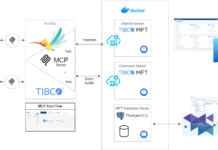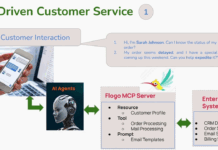
By the end of the year, most companies have locked their plans to start or accelerate the digitalization of their businesses. They have taken into consideration that most of the objects around us are able to generate and consume data, making the physical world hyper-connected. Data, devices, services, and partners are accessible via relatively simple-to-use APIs. Insight from data about what happened can be combined with understanding context around what is happening to make the right decision at the right time, seizing what Gartner calls “Business Moments.” All of these capabilities provide unprecedented business opportunities to better understand customers, engage with them more often, and ultimately increase revenue by exposing existing services across new channels or create net-new ones.
But is this the only impact of digitalization on the organization? Are these projects run the same way that most projects were managed five years ago? Not at all. A new type of employee now runs business differently: the Digital Citizen. Digitalization happens not only at the scale of organizations, but on a global scale as well. Our personal lives are being digitized as quickly as, if not faster than, our professional lives. Many trends that happened within the enterprise—such as BYOD, the rise of SaaS applications, and the new balance between Line of Businesses and IT to leverage technology—have now converged.
The Digital Citizen, true to its name, works with data. Digital Citizens understand how data fuels the processes and decisions they’re involved with. They understand technology much more than their peers did a few years ago. They’re also aware of the speed of innovation, constantly monitoring the technological scene for an idea they can apply in his context. They believe in testing early and deciding without making assumptions.
So what makes this Digital Citizen different? Here are the 10 traits of a Digital Citizen:
- Accesses data, anytime, anywhere. Digital Citizens knows they’re a part of the hyper-connected world and they expect to access the data they need across multiple channels, whether they’re in the office, at the gym, at a conference or on their couch.
- Lives at the speed of the business. Digital Citizens are looking to be on top of what’s happening in their business, as well as what’s happening across the globe via social networks, or even their own house via sensors. They’re looking for notifications of situations of interest, such as a campaign overachieving expected results, or a customer process reaching a critical state.
- Uses apps, not applications. Digital Citizen use purposeful apps that excel at solving a specific issue or provide unique value. They’re not looking for applications that pretend to encompass their needs. Their needs are unique to their business, and evolve quickly. The Digital Citizen will provide a unique solution, without waiting for a new release of a platform from the IT team or software vendor.
- Minds their own data. Since Digital Citizens are not operators, but assemblers of data and capabilities they have carefully picked, they need to combine their data and share it across applications. They’re looking for services allowing ready-made integration to process the data the way they need it between apps.
- Uses unique ways to reach unique insights. Since they can access their own data, Digital Citizens want to work on what becomes their data, not just read reports based on a logic they do not control. They will use analytic solutions that allow them to graphically interact with the raw data of any sort. The Digital Citizen is also looking for solutions that will accelerate this process, for example, by identifying correlations in the data and guiding the user with recommendations.
- Knows people are connected, too. Digital Citizens know their findings can be useful for their peers, as they’re also leveraging their experience. They’re looking for solutions to share their insights in the most appropriate way.
- Looks for all types of data for their decisions. Digital Citizens are also looking at information captured on the fly as much as they’re looking at data aggregated over time. They know business moments (marketing campaigns, customer orders, customer experience, manufacturing process) are highly contextual, and can be identified by a specific pattern of events. Therefore, the Digital Citizen is looking for ways to easily access this data for analysis to reach improved awareness.
- Turns decisions into actions. The Digital Citizen acknowledges the level of awareness data provides, but also the impact it can make. From sending a message to a customer to changing the course of a process to reallocating an asset, the outcome of the situation can be changed. From customer intent to action, or from the start of a security breach to the prevention of fraud, organizations can seize opportunities and prevent threats. Digital Citizens are not willing to take part or even wait for complex development processes to take place. They want to configure specific rules in interfaces and abstract technological complexities, so as to streamline their decisions.
- Needs decisions applied right now. Once Digital Citizens have decided which actions need to be taken in the event of a specific context, they need to apply this decision immediately. This means not only making sure it’s put in place in minutes or hours, but also that the action is taken as the situation unfolds.
- Shares to receive. Digital Citizens are building their own experience, and making their own decisions, refining their expertise by testing constantly and adopting what truly provides a benefit. But in a world where many organizations access the same data from key providers such as Google, social networks, and the same apps to manage standard functionalities, Digital Citizens can accelerate their work by finding solutions in communities of other citizens involved in the same domain as them.
One of the most interesting aspects of Digital Citizens are that their behavior and tastes are exactly the same as employees and customers. Data empowers Digital Citizens by providing them the ability to make informed decisions and apply them immediately. Organizations will take the initiative to develop Digital Citizens within their staff—creating the environment they need to thrive will provide immediate benefits for customers, accelerating their march toward a true digital business.





